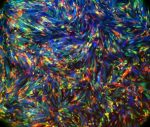
Synthetic gene circuits are emerging as a versatile means to target cancer with enhanced specificity by combinatorial integration of multiple expression markers. Such circuits must also be tuned to be highly sensitive because escape of even a few cells might be detrimental. However, the error rates of decision-making circuits in light of cellular variability in gene expression have so far remained unexplored. Here, we measure the single-cell response function of a tunable logicANDgate actingon twopromoters in heterogeneous cell populations. Our analysis reveals an inherent tradeoff between specificity and sensitivity that is controlled by the AND gate amplification gain and activation threshold. We implement a tumor-mimicking cellculture model of cancer cells emerging in a background of normal ones, and show that molecular parameters of the synthetic circuits control specificity and sensitivity in a killing assay. This suggests that, beyond the inherent tradeoff, synthetic circuits operating in a heterogeneous environment could be optimized to efficiently target malignant state with minimal loss of specificity.

N’hésitez pas à consulter le communiqué de presse associé à cet article : Des circuits génétiques à l’assaut du cancer
References:
Cellular heterogeneity mediates inherent sensitivity–specificity tradeoff in cancer targeting by synthetic circuits.
Mathieu Morel, Roman Shtrahman, Varda Rotter, Lior Nissim, and Roy H. Bar-Ziv
Proc. Natl. Acad. Sci. USA, 2016
doi: 10.1073/pnas.1604391113
Cellular heterogeneity mediates inherent sensitivity– specificity tradeoff in cancer targeting by synthetic circuits
